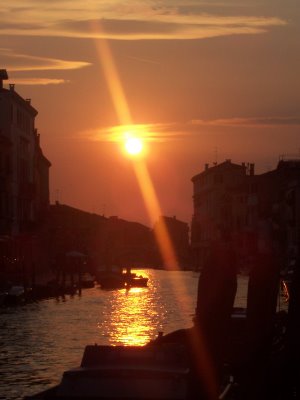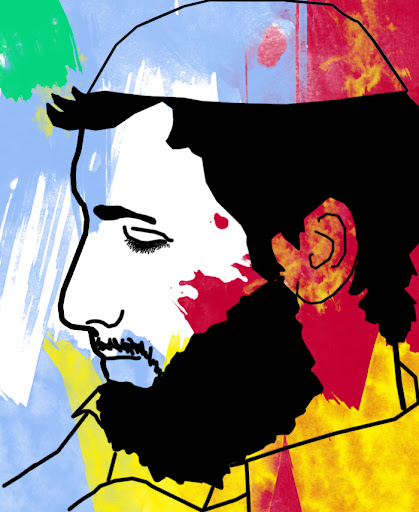Picture of the Week:
This picture was taken in front of Gam Gam Kosher Restaurant in Venice.
I noticed a group of people snapping photos from a nearby bridge and decided to take a shot as well.
Chanukah commemorates the victory of the Jewish forces, the Maccabees, over the Syrian Greek army that occupied Israel in the Second Century B.C.E . After reclaiming the Holy Temple and the subsequent cleansing and purification, all was in order, save the oil needed to kindle the Menorah, the seven armed candelabra which stood in the sanctuary. The Greeks, who abhorred the 'irrational' tenacity to which the Jewish people held to laws of ritual purity –laws which essential extend beyond the bounds of human logic and reasoning (logic in turn being the very essence of Greek culture) - went out of their way to defile all the jars of oil in the Temple's storage. A flask of oil left pure and stamped with the signet of the High Priest was found, but the success was bitter sweet to the Maccabees, for it would take another seven days to process more oil for the Menorah and the flask contained only enough to last for a single day. Having done all that they could possibly do, however, the left they rest to G-d and proceeded to light the Menorah. As we all know, a miracle occurred and the light continued to burn for a total of eight days, enough time for more oil to reach Jerusalem.
In celebration for the great miracles that occurred at that time; the physical salvation and victory of the Jewish people against their enemies, and the spiritual wonder of the oil, we light Chanukah candles every year . . .
While the story delivers a powerful message of Jewish strength and endurance, what do we gain from the seemingly simple act of lighting candles for eight nights? We know that the Torah is enduring, and its precepts are not mere acts to be repeated in rote; but rather every Holiday is a revelation of the same divine energy that came into play during our past. By lighting Menorah, then, we are not only commemorating the past, but rather reliving it –bringing it down into our physical, present, lives.
The Menorah is lit as the evening begins (besides when it is the Eve of Shabbat, when we light it slightly earlier to avoid desecrating the sanctity of the Sabbath); shadows grow long as the sun sets into the inky darkness . . . the streets grow empty as people return to their homes in the face of the long winter night ahead . . . yet a lone light pierces the thick gloom –a Jewish has lit Menorah in his window.
Mitzvos can be divided into two general groups: Those which are performed through action -Tefillin, lighting candles for Shabbat, and giving charity to name a few- and those that are performed by not acting –Not eating non-kosher, not stealing and the like.
Each type of mitzvah accomplishes a different purpose. On one hand by performing a physical deed we uplift and sanctify the world around us –the cow that yesterday said 'Moo' and ate grass has today become a Torah scroll, the hand that could be used to harm has been used to heal. Yet, this power to uplift is limited only to those objects which are permissible to us, those objects that possess enough innate sanctity that we can refine them . . . a pig skin may be great for a football, but it can never make a kosher Torah Scroll. This type of Mitzvah then is limited to only a certain 'permissible' set of objects.
Those 'Negative' commandments, prohibitions, may lack in action, but they can reach a far greater target as it were. In the eyes of the Kabbalists to not do is to not need. The divine energy and connection accomplished through not doing these precepts is far greater then any that can be done through a specific action on our part. In other words, the very fact that performance requires action shows that it can only bring down an energy that can be defined by action –that which is higher can only be actualized by the lack of action. These 'negative' commandments can therefore uplift those things which in other ways would be untouchable. This mode, however, can not physically uplift and deal with evil . . . it refines it, but through running away from it.
When we light the Menorah something spectacular happens, we shed light into the darkness, we bring holiness to the public domain, but with the advantage of action –that we make it manifest in our own world!
For some strange reason, due perhaps to a history of oppression and forced ghettos, we Jewish people are viewed as introverts, afraid of the world at large. Chanukah comes, and like the dreidle, spins this notion onto its head. Not only do we not flee from the world, from the night and cold of the deep winter, but rather we illuminate it.
How do way gain the power to accomplish this mighty task? This message as well is found in the Menorah. To this day the Menorah is traditionally lit with pure olive oil, as it was in the times of the Temple.
Olive oil possesses two special, yet seemingly opposing qualities. On one hand oil remains aloof from the world around it –mix oil with water and it will float to the top above the water. Conversely oil permeates its surroundings –it seeps into almost any object (Anyone who has ever gotten an oil stain on an expensive article of clothing can attest to this fact)
May it be G-d's will that through increasing in light and holiness, as we do in the Chanukah candles, we bring about the ultimate light and holiness of Moshiach!
A Happy Chanukah to you all!
Note:
May I ask those of you that took your time to read through the essay -is it clear? Is it too dense? Any feedback would be nice.
Technorati Tags: Venice, Photography, Chanukah, Dvar Torah








0 comments:
Post a Comment